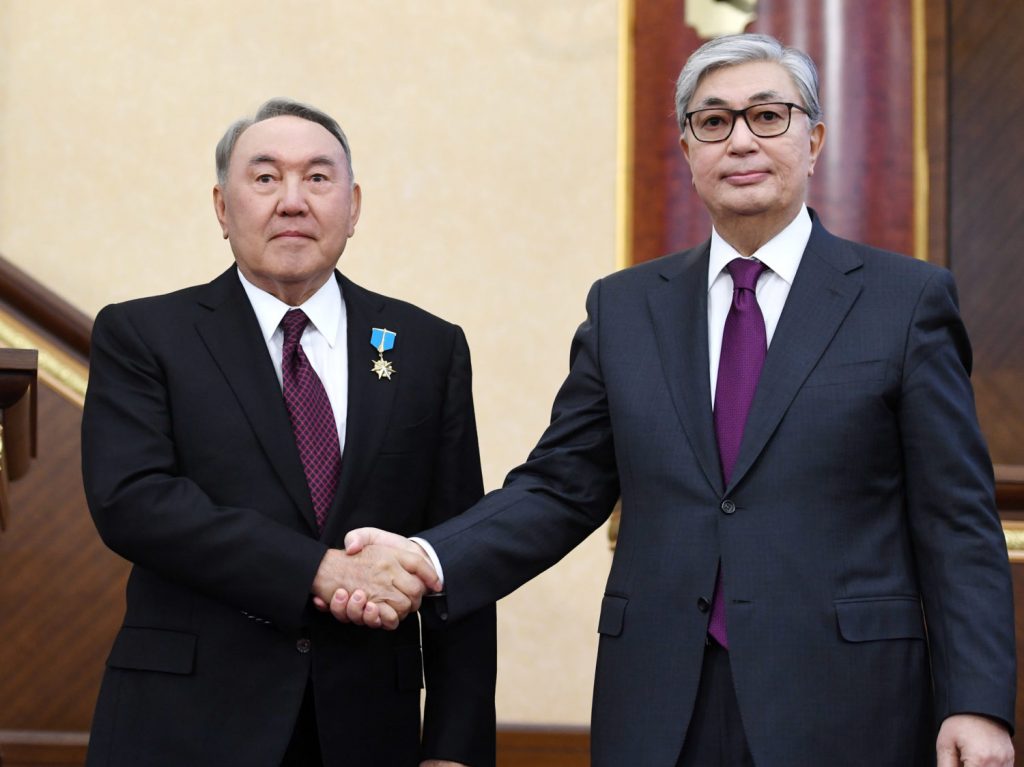 2019 was a new historical stage for Kazakhstan. For the first time in domestic politics, a transition of power was carried out – a key and important issue onthe national agenda.
2019 was a new historical stage for Kazakhstan. For the first time in domestic politics, a transition of power was carried out – a key and important issue onthe national agenda.
The final moment was the presidential election, following which Mr Kassym-Jomart Tokayev (right) won the mandate of public trust. He became not just a legitimate Head of State, but also received electoral recognition.
The country entered a new historical stage, full of new hopes and expectations.
At the same time, the first experience in the transition of power has increased individual scrutiny of President Tokayev’s activities. This is natural, as the country is on an important segment of history when the trajectory of further development is being laid.
In addition, international attention to the processes within Kazakhstan and its actions on the world stage have significantly increased.
On June 12, 2019, Mr Tokayev officially assumed the role of Head of State and, without waiting, he determined the main areas of activity and set priorities for the work of the government. The experienced leader immediately built a clear line of state policy, confirmed the continuity of the foreign policy and announced during the inauguration that he will continue to implement the strategic programmes of the First President of Kazakhstan, Leader of the Nation Nursultan Nazarbayev (left).
And all the new initiatives will be focused on specificity and effectiveness.
During this year, President Tokayev ensured a smooth and stable transfer of power, which is a key condition for the transition. On the one hand, he continues to implement the current state course. On the other hand, he has brought a new impetus, ensuring evolutionary development.
Mr Nazarbayev, as a nationwide leader, fully supports President Tokayev. Ensuring the continuity of power, the second leader of Kazakhstan has laid a new vector for state development based on dialogue with society, pluralism of opinions and diversity of views.
The period of political transit in Kazakhstan has coincided with global changes and transformations, which also left its mark on the actions of the new President. Kazakhstan has also faced the task of not only following its own path, but also, in view of the country’s international obligations, to demonstrate the immutability of all agreements with its partners, stability in the current development and striving for new growth horizons.
In the changing realities, President Tokayev had to look for new forms of work when, at the same time, it was also necessary to maintain the general strategy of the development of the Republic of Kazakhstan.
The global trend of protests continued in 2019, which was the result of the expression of desynchronisation between political and economic processes. In a certain sense, Kazakhstan has come to a fork in the road, because the further course of development depended on the actions of the authorities.
President Tokayev refused a simple response model – “tightening the screws”, relying instead
on a rational dialogue. New internal political paradigms have been established: “a state that listens”, “different opinions – one nation”, “successful economic reforms are impossible without modernisation of the country’s socio-political life”, “Strong President – an influential Parliament – an accountable Government”.
According to the new reality, new mechanisms have been introduced into the political culture. The state abandoned the practice of blocking the Internet, violently dispersing protesters, and authorised rallies have been held in the country’s cities.
Intelligent use of power, based on a full-fledged dialogue and patient communication, is becoming a new trend in the country’s political space.
The world does not stand still. Today the field of communications is becoming one of the most significant elements in the dialogue between the authorities and society. Being an active user of social media networks, President Tokayev himself quickly gives an assessment of various events taking place in the country. In addition, he has spoken openly on all resonant matters, giving a direct signal to citizens that he keeps under his personal control all issues of public concern. Thanks to this, the authority of the leader is growing.
Despite the trend of dialogue and liberalisation, President Tokayev has maintained control of the state apparatus and its executive discipline. The country is gradually changing the format of official events, which are becoming more public. These are all very important steps from the point of view of political culture, which have set new standards for the behavioural model of the authorities and raise the bar for the ruling elite.
The principle of a “state that listens” has been established in the country, bureaucratic delays have been removed as much as possible and citizens have the opportunity to directly ask questions to authorised bodies and quickly receive answers to all their concerns.
An important direction in the activities of President Tokayev was to increase confidence in the state and the effectiveness of public administration. To overcome these problems, he established the concept of a “state that listens”, which has become the main philosophy of public administration. In this regard, a virtual surgery has been launched on the website of the President.
Furthermore, a unit that engages with the population’s appeals has been created in the structure of the Presidential Administration, headed by an assistant to the Head of State. Leaders of all levels have joined social media channels, thereby significantly increasing the indices of openness and accessibility of the state apparatus.
One of the key points of Mr Tokayev’s presidential agenda was the creation of the National Council of Public Trust, which includes well-known politicians, public figures, economists and intellectuals. The work of the National Council is carried out in political, social and economic areas, the most urgent and acute issues of state development are included on the agenda.
Thus, the Kazakh leader has demonstrated a genuine interest in dialogue with the society and the joint development of decisions that will determine the development of the state. Based on the results of several meetings with the participation of the President, a package of important political reforms was developed and adopted, impacting the laws on peaceful assemblies, the law on elections, the law “On Political Parties”, and enshrining in practice the principles of political pluralism.
Over the past year, President Tokayev implemented a set of measures aimed at improving the social well-being of both individual segments of the population and society as a whole. An amnesty on loans was implemented in the country for mothers with large families, families with children with disabilities, orphans and families who do not have an income provider.
Overall, more than 500,000 people were impacted by the amnesty. Thus, citizens who were in difficult life situations were freed from debt. A system of social support for the population is developing. From this year, student scholarships and salaries of public sector employees — educators, employees of civil protection bodies and the law enforcement bloc — have increased.
One of the principles of President Tokayev is that stability is not the only important factor – it is also necessary to ensure that every citizen of the country feels safe. In order to strengthen the system of protecting human rights and public safety in 2019, in his Address to the Nation, the Kazakh leader instructed to toughen criminal penalties for drug trafficking, rape, human trafficking, poaching, etc.
At the request of the President, the Mazhilis of the Parliament adopted a number of important legislative amendments in these areas. These crimes are classified as especially serious and will be severely punished. Illicit manufacture and sale of drugs is punishable by imprisonment for up to 15 years. For rape, the term has been increased from 8 to 20 years or for life. For trafficking from 7 to 12 years. All these measures significantly strengthen the foundation of popular support for the course of the President.
The first months after the transition of power were a time of substantial discussion, emotions and expectations for the future. In addition to political transition, which affects all processes in the state, an additional test during the year was a series of crises in the country, which seemed to specifically test the strength of the Kazakh statehood. These incidents made Kazakhstan stronger.
These crises include an incident in June 2019 in the city of Arys with a population of more than 75,000 people, where old military depots exploded, which destroyed the urban infrastructure. Mr Tokayev personally took under control the construction of a new city, thanks to which the city of Arys was
rebuilt anew in three months.
There was also a major flood in May 2020 in the Turkestan region, which led to the evacuation of more than 31,000 people. The situation was quickly brought under control, support was provided to the local population and operational restoration of local infrastructure took place.
There is also a severe pandemic of the new coronavirus COVID-19, which literally surrounded Kazakhstan due to the outbreak of the epidemic in neighbouring countries. Mr Tokayev confidently led the Kazakh citizens through the state of emergency and full quarantine, introduced for the first time in Kazakhstan, which lasted for two months.
Today, the country is emerging from the pandemic with minimal losses and is gradually recovering.
From the first days of the presidency, Mr Tokayev set the Government of Kazakhstan the task to develop a set of measures to stimulate economic growth, improve fiscal and monetary policies, develop entrepreneurship and support domestic producers.
The President’s attention was focused on the socio-economic development of the country, the formation of the revenue side of the state budget and the reduction of the dependence of the Kazakh economy on energy exports.
The coronavirus pandemic in 2020 and the decline in global demand for raw materials led to a sharp slowdown in economic activity in all countries of the world. These factors have impacted the economy of Kazakhstan, the number of jobs and the welfare of the people.
Despite the global negative trend, which has influenced Kazakhstan, the country has sufficient fiscal capabilities and foreign exchange reserves to support businesses and domestic demand.
The government has kept the situation under tight control and has all the necessary resources to ensure socio-economic stability in the country. Kazakhstan’s international reserves in foreign currency today amount to more than US$30 billion and the assets of the National Fund of Kazakhstan exceed US$58 billion.
In response to external challenges, President Tokayev is promoting a package of measures to stimulate the economy, thanks to which the current crisis can create conditions for economic diversification from excessive dependence on the oil and gas sector.
The EBRD expects a decline in Kazakhstan’s GDP in 2020 by 3%, while, as a result of the package of economic measures adopted in Kazakhstan, international economists forecast a resumption of economic growth in 2021 at 5.5%.
Through victory in the presidential election, Mr Tokayev ensured international legitimacy of the transit of power. All key geopolitical centres recognised his victory, demonstrating interest in the country’s stable and sustainable development.
Upon taking office, President Tokayev reaffirmed the country’s foreign policy. The head of state met with the leaders of key geopolitical centres and Kazakhstan’s strategic partners – Russia, China, the US, EU countries, Central Asia and the Islamic world.
During this year, a new concept of foreign policy was adopted, which outlines the priorities of Kazakhstan’s foreign policy until 2030. In addition to Kazakhstan’s traditional foreign policy directions aimed at constructive cooperation with foreign partners, promoting international cooperation and regional integration, initiatives to strengthen global security in the document also contain new areas.
Much attention in the new concept is paid to strengthening the economic component of foreign policy, focused on creating external conditions for realising the economic potential of Kazakhstan and finding profitable transit corridors to world markets under the conditions of sanctions, unpredictability of world markets, trade wars and protectionism.
In the new global geo-economic realities, Kazakhstan is optimistic in the search for new economic niches and sources of income.
It is June 2020 and the transition period is ending, the country is gradually moving forward. This was the energetic first year of the presidency, which laid the dynamics for the coming period.
President Tokayev frequently stresses the continuity of the course of the First President of Kazakhstan Nazarbayev. Over the past year, the state has continued to follow the previous practice in both foreign and domestic policies.
Today we can conclude that Kazakhstan has confidently passed the transit border of uncertainty. President Tokayev had a complex task – to preserve the best achievements, strengthen stability and begin to build a new format of development in an era of active global change.
During this year, led by its President, Kazakhstan demonstrated its own model of evolutionary succession of power. The country is headed by a leader who understands the whole legacy of statehood and has a conceptual vision of the further development of Kazakhstan.







